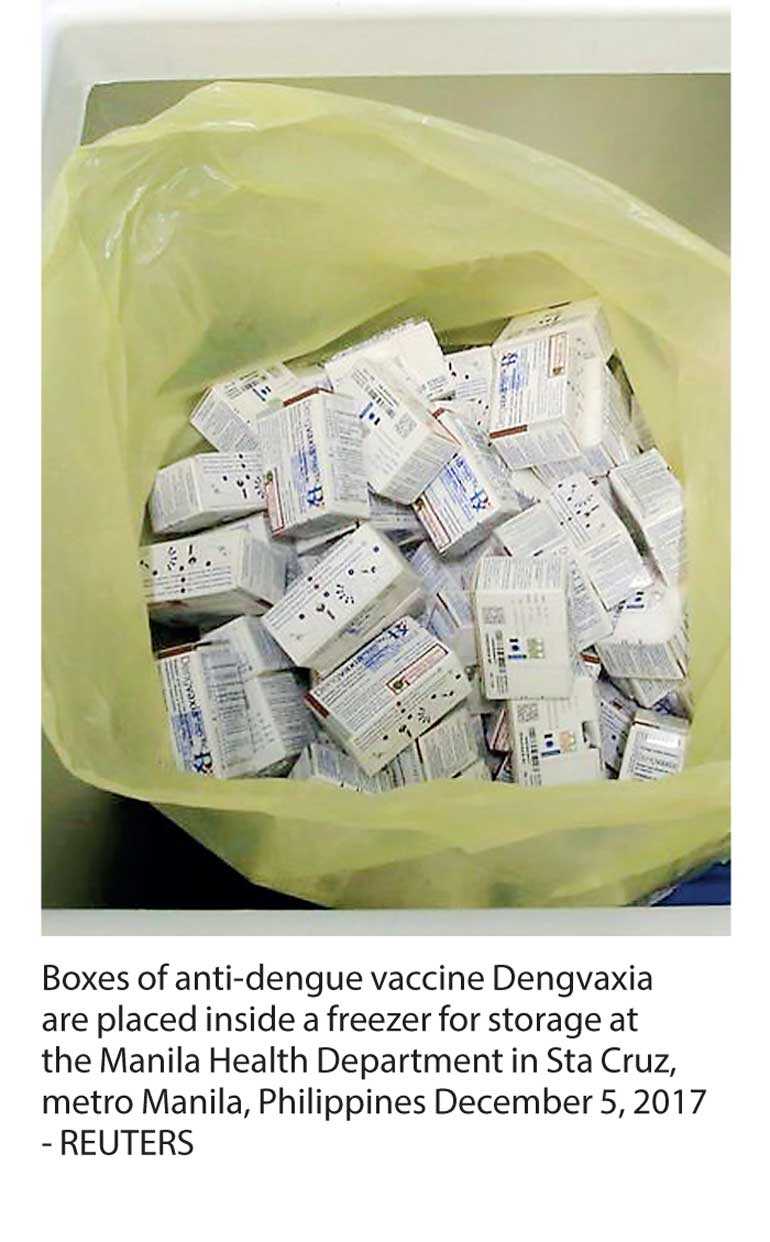Monday Feb 23, 2026
Monday Feb 23, 2026
Wednesday, 2 May 2018 00:00 - - {{hitsCtrl.values.hits}}
 Paris/Chicago (Reuters): The World Health Organization (WHO) said on Thursday Sanofi’s vaccine against dengue should only be used after testing on individuals to assess whether they have ever been exposed to the infection.
Paris/Chicago (Reuters): The World Health Organization (WHO) said on Thursday Sanofi’s vaccine against dengue should only be used after testing on individuals to assess whether they have ever been exposed to the infection.
After a two-day meeting in Geneva, Switzerland, experts at the UN agency recommended extra safety measures for the medicine, sold as Dengvaxia.
“We have now clear information that the vaccine needs to be dealt with in a much safer way by using it exclusively in people already infected with dengue before,” Alejandro Cravioto, Chair of the WHO’s Strategic Advisory Group of Experts (SAGE) on Immunization, told reporters.
“It requires for the people to be tested through a system that is not currently available but that we feel will be developed in the next years,” he said.
Sanofi said in a statement: “We are confident in Dengvaxia’s safety and its proven potential to reduce dengue disease burden in endemic countries.”
Sanofi also said it would “continue to work with the international public health community and endemic countries, to ensure the best usage of the vaccine.” The French drugmaker warned in November that Dengvaxia, first approved in late 2015, could increase the risk of severe dengue in some cases in people who had not been previously exposed to the disease.
Mosquito-borne dengue is the world’s fastest-growing infectious disease, afflicting hundreds of millions of people worldwide. It causes half a million life-threatening infections and kills about 20,000 people, mostly children, annually.
Dengvaxia, the world’s sole licensed vaccine against dengue, is at the centre of a health scare in the Philippines where the government suspended its use last year amid safety fears.
The company has repeatedly said it knows of no deaths resulting from the medicine.
Joachim Hombach, executive secretary of WHO’s SAGE group, said: “For us, the primary consideration is to assure our recommendation makes public health sense in terms of ensuring the use of vaccine will maximise public health benefit and minimise risk.” “It is very important we signal ways in which this vaccine could be used,” he said, adding that it was up to the company to decide how to deal with this. Hombach defended the WHO’s initial recommendation that the vaccine could be used in children aged nine and older in places where 70% of the population had previously been exposed to the virus, and were likely to benefit from the vaccine.
He said the WHO pointed out a gap in data on the use of the vaccine in people who had never been exposed to the virus, and asked Sanofi to study the impact of the vaccine on children who had never been exposed to the virus.
That study resulted in Sanofi’s announcement last November.
Executives at Sanofi have denied any wrongdoing and insist on the benefits the medicine brings as a whole. In an interview with Reuters last month, David Loew, head of Sanofi Pasteur, the group’s vaccines division, said Sanofi remained committed to Dengvaxia.
He added Sanofi was holding discussions with external partners and universities to come up with a test which would be applicable before vaccination. Such a test, however, would take at least two years to bring to the market, he said.
Dengvaxia has been approved and registered in 19 countries and is currently under review by the European Medicines Agency.
Japan’s Takeda Pharmaceutical, the United States National Institute of Health and Brazil’s Butantan Institute are developing rival products.
Initially seen as potential $1-billion-a-year-plus product, Dengvaxia net sales stood at three million euros ($3.71 million) in 2017 as Sanofi was forced to buy back unused doses. The company took a charge of 87 million euros in the fourth quarter.